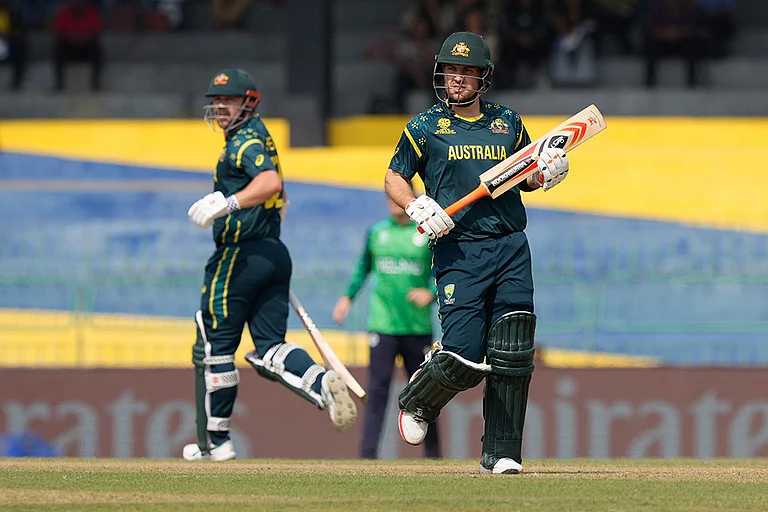In the 1965 superhit crime thriller ‘Gumnaam’, the ruthless smuggler Madanlal lures his former accomplices to an uninhabited terrain and kills them one by one. In Moni Bhattacharjee’s seminal dacoit saga ‘Mujhe Jeene Do’ (1963), the Police Superintendent wages a brave yet compassionate war against dacoity in Chambal. In Hrishikesh Mukherjee’s ‘Anupama’ (1966) Mohan Sharma is the ‘Jekyll & Hyde’ father of Uma who hates his daughter by day and brings home armfuls of gifts lovingly for her after sunset when he was drunk.
Each character was as different as the faces engraved on Mount Rushmore. Chiseled to perfection by actor Tarun Bose, one of the underexplored jewels of Hindi films.
Born in Calcutta in 1928 and brought up in Nagpur, Bose spoke fluent Hindi and Urdu with no Bengali accent. In fact, it was the other way around. In his first Bengali play the reviewers said, “Why do non-Bengalis attempt Bengali plays?” Peeved at this, he worked on his Bengali and delivered improved dictions in the many Bengali plays that he went on to act down the years. Meanwhile, when he was in his mid-teens, Bose successfully auditioned at All India Radio which had just launched their Nagpur station.
Years passed. At a fund-raising play at St. Francis School, Nagpur, the chief guest Bimal Roy loved Bose’s performance and soon, Bose got a call-up from Roy on June 8, 1957 to come to Bombay for a screen test, recounts Shilpi Bose, daughter of Bose in her blog. And thus, Bose debuted in Hindi films in the Asit Sen-directed Bimal Roy production ‘Apradhi Kaun’ (1957), playing a doctor who was a red herring suspect in the whodunit murder story.
With a family including aged parents to support back home in Nagpur, Bose had negotiated for a fixed salary with Roy — a rare instance because by then the era of ‘studio employees’ had given way to freelancers. This is why Bose’s five of his first six films between 1957 and 1961 were Roy productions/co-productions – ‘Apradhi Kaun’, ‘Madhumati’ (1958), ‘Sujata’ (1960), ‘Usne Kaha Tha’ (1960), and ‘Kabuliwala’ (1961). Later, Roy kindly permitted Bose to work for other production houses as well, opening opportunities for him with noted producer and directors like H.S. Rawail (‘Kanch ki Gudiya’, 1961), Biren Naug (‘Kohraa’, 1964), Rakhan (‘Meri Surat Teri Ankhen’, 1963), and of course, the ones mentioned at the beginning of this story. In these he played a mix of villain and character roles.
But, despite all this, why was Bose not considered in the same league as Pran, KN Singh or Jayant and others when it came to villain roles? Similarly, he never seemed to be a front-list choice in character roles unlike Nazir Hussain, Om Prakash, David, or Iftekhar. The reason was – those days the stock film goer looked for specific traits in their favorite actors; and they wanted their idols to keep repeating those film after film — akin to familiarity of a favorite dish with one’s taste buds. For example, a KN Singh would not be their KN Singh without the signature menacing pout and flared nostrils. Would Pran be the Pran sans that cruel, thin-lipped smile and eyes that schemed all the time? Whereas Bose ‘changed’ into the appropriate ‘face’ and ‘expression set’ according to the role, the way we choose clothes from our wardrobe. He could scare the audience alright but without being physically imposing unlike, say, a Jayant. He even had an assortment of laughter.
Recalls Shilpi Bose in her blog, “Before he packed his bags and came to Bombay the producers at the Nagpur radio station requested my father to record different kinds of laughter which they planned to use whenever required. It was this ability of his —to laugh convincingly— which made a major impact in the suspense thriller Kohraa.”
Bose dissolved into his roles till only the character was visible and not the actor Tarun Bose. But then no ‘Tarun Bose’ meant no committed fan base. Similarly, when it came to character roles, templates like Nazir Hussain as the weepy old man or David as the Humpty Dumpty kindly uncle did not apply for Bose. The character Mohan Prabhu in Phani Majumdar’s ‘Oonche Log’ (1965) transitioned from a simpleton lab assistant to an angry brother avenging his sister’s abetment to suicide. The dramatic “blind man’s buff” confrontation between Mohan and Major Chandrakant (Ashok Kumar) in the last 27 minutes building up to its tragic climax demanded mannerism-free, pure concentrated acting by the actor playing Mohan. It was Bose — a servant of the script.
The other reason for Bose not figuring in the top draw was that he found his opportunities only within the Bengali camp, unable to break through into the heavyweight Navketan, BR Films, Mehboob Films, Filmistan, or Nasir Hussain camps. Even within the Bengali producers, Bose never found favor with Shakti Samanta or Promode Chakravorty, save for a solitary ‘Love in Tokyo’ with the latter.
True, as an actor, Bose could have been more flexible. According to Shilpi, he disliked lip synching to songs, thus losing an important channel of recall among viewers. She adds that he preferred villain roles as those gave him greater scope to perform and yet, he avoided playing the drunk or scenes that required the villain to molest a lady character. All these filters obviously shrunk the pie.
A caring father and husband, a soft-natured human being, a committed performer Bose passed away at the age 43, leaving behind a short but strong legacy of performances.
(Balaji Vittal is a National Award-winning and MAMI Award-winning author of Bollywood books, a columnist, a Bollywood commentator, and a public speaker. He can be reached on Twitter at @vittalbalaji and his website is www.balajivittal.com. Views expressed are personal.)


























